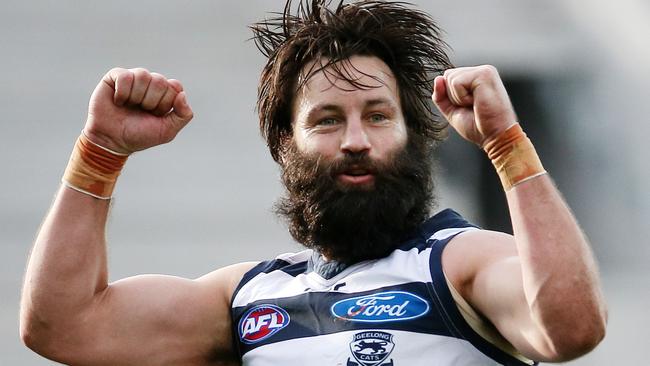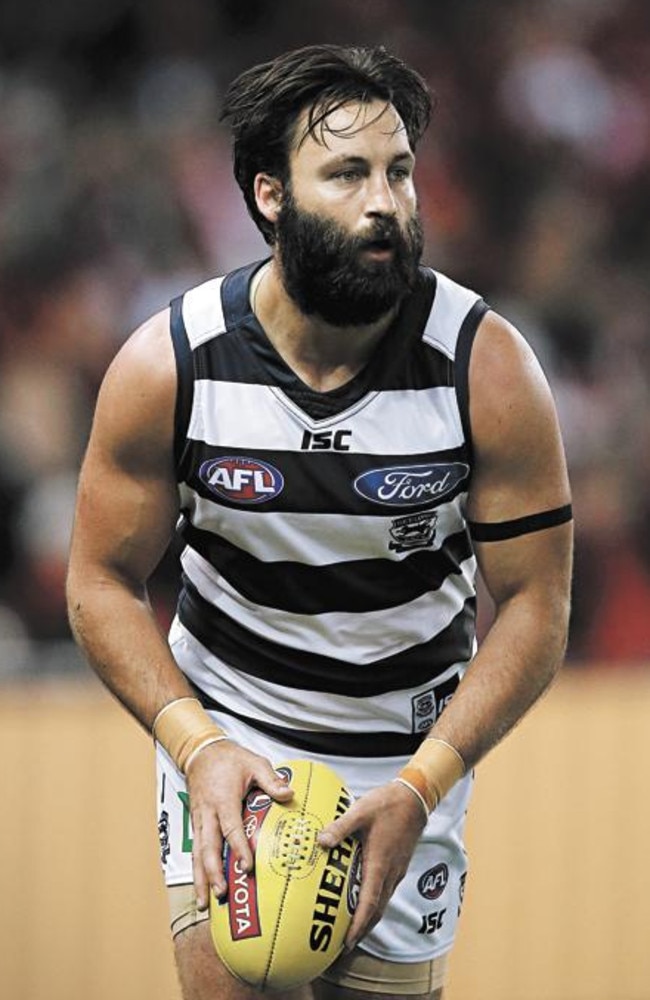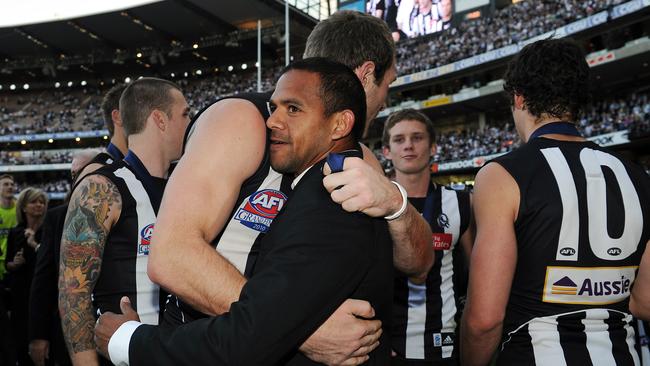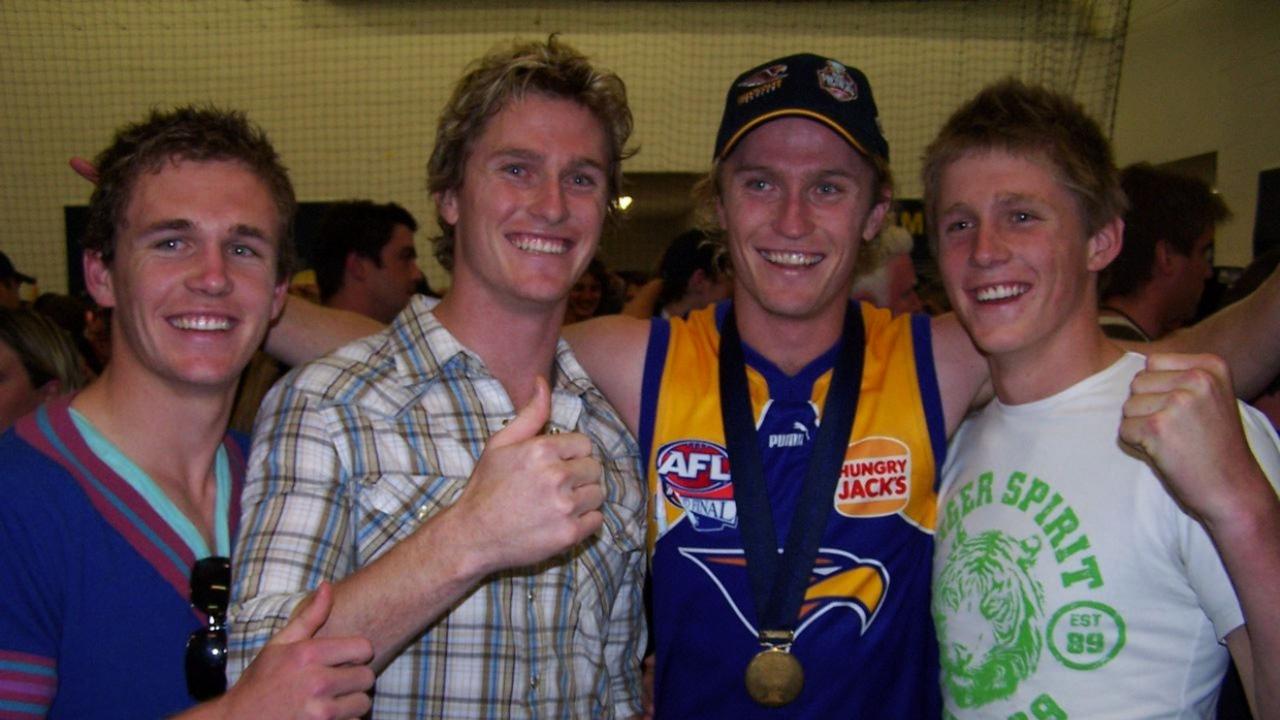Jimmy Bartel’s spot in Geelong team is coach Chris Scott’s greatest dilemma
THE toughest decision a coach can ever make is to axe a player from his club and Chris Scott has a huge call to make on Jimmy Bartel, writes MICK MALTHOUSE.

Expert Opinion
Don't miss out on the headlines from Expert Opinion. Followed categories will be added to My News.
THE toughest decision a coach can ever make is to axe a player from his club. Second to this — and only just — is to drop a player from a final.
It’s harder still when that player is a leader and a champion.
Geelong coach Chris Scott faces a huge decision this week.
Does he keep Jimmy Bartel in the preliminary final team for his big game experience, his on-field voice and his Brownlow skills?
Or does he replace him with defensive forward Shane Kersten, or even Lachie Henderson returning from minor knee surgery?
Scott will no doubt have sleepless nights weighing up his options but in the end he has to trust his gut feel.
Statistics aren’t always the most reliable form predictor – in fact, rarely I’d say – compared to just knowing your players.
MORE READING:
BARTEL: ‘I DON’T THINK I HAVE TO JUSTIFY MYSELF’
TRAINING PICS: NO REST FOR CATS DURING WEEK OFF
CATS COACH: SCOTT DEFENDS RELATIONSHIP WITH BARTEL
MARK ROBINSON: BARTEL NEEDS TO MAKE DIFFICULT DECISION
Bartel’s marking and kicking are as strong and effective as always. He is a big stage player, no doubt, but his leg speed is suddenly lacking.
One common trait in ageing players is their loss of pace. They’ll go to ground more often and get rid of the footy too quickly.
But a player who has won premierships and a Brownlow is one you would give your right arm for in a final, if you can trust that he’ll produce a winning four-quarter effort.

Because that’s what you do for a final — you pick the side that you believe can win.
You must almost be void of emotion, and be brave, because the regret of picking the wrong player will sit with you forever.
I missed out on playing in Richmond’s 1982 Grand Final after playing every game of the season because I injured my shoulder — and let me tell you it was devastating. It is mental anguish at its most intense.
Therefore, when I made the call to drop my captain from the West Coast Eagles’ first ever semi-final, I agonised over the decision.
We had drawn with Collingwood in the qualifying final and were beaten badly in the rematch a week later, and I felt that Steve Malaxos’ contribution in both games was less than satisfactory.
We were entering our fifth game on the road, which is amazingly tough and was unprecedented, and we were taking on the fleet-footed Demons.
The skipper’s lack of leg speed was niggling at me so I left him out of the team.
He took it extremely hard and it turned out to be his last game for the club.
We went on to beat Melbourne, but I don’t feel that winning was justification for dropping Malaxos. I’ve never felt that — more that we got selection right and the team chosen held up its end of the bargain.

I have, though, felt regret for dropping a player from a Grand Final and even now it pains me to think about it. That player was Leon Davis.
When Collingwood drew the Grand Final with St Kilda in 2010, I had at my disposal a talented utility in Tyson Goldsack pushing for selection.
Leon had failed in the draw and my worry was whether he would fail again.
So I weighed up the pros and cons. Who would give us the best chance of winning?
Both damn good players, but one was more versatile and against the Saints I needed that option.
I have the highest regard for how Leon took the news and supported his teammates that following Saturday.
Given that we won by 56 points in the replay, if I had my time over I would pick Leon.
That’s nothing against Tyson at all, but I would love for Leon to have won a premiership medallion in the end.
Finals football doesn’t take prisoners. If you’re not up to it you will be found out.

It is my belief that the best definition of a great player is one who stands up on the big stage. So many don’t.
A coach must pick form players and he must pick fit players, or the team will be left wanting, because finals football is a different ball game entirely to the home-and-away season.
And that is why I chose a player who played every game of the Eagles’ season in 1994 to play in the Grand Final against the Cats, instead of a highly-rated defender who had missed several games with osteitis pubis.
Mitchell White came back into the West Coast preliminary final team to take on Melbourne after a four-week layoff to replace the injured Ashley McIntosh.
But when “Milli” proved his fitness for Grand Final selection I had to decide who he would replace — Mitchell White or 19-year old Shane Bond?
Bond won out due to consistent form and the doubt I had that White could get through four terms of a Grand Final.
Mitch seemed to know it was coming but that didn’t make it easier to tell him. At least he already had a 1992 premiership medal.
To this day, I still don’t know whether I got that right.
When a player misses out on a final, particularly a Grand Final, his teammates are gutted for him – until the siren sounds and it’s game on.
Then only he and the coach will remember that he didn’t get to play.
Bombers supporters will fondly recall their 1993 Grand Final win, but I don’t think too many would ever think about Derrick Kickett’s late omission.
I bet he still does, though.
It’s a conundrum like no other for a coach, with an ever-lasting effect on a player.
Whichever way Chris Scott goes on Friday it will be for the greater good of his team.
And that is how it should be.


 I have felt regret for dropping a player from a Grand Final and even now it pains me to think about it. That player was Leon Davis.
I have felt regret for dropping a player from a Grand Final and even now it pains me to think about it. That player was Leon Davis.

